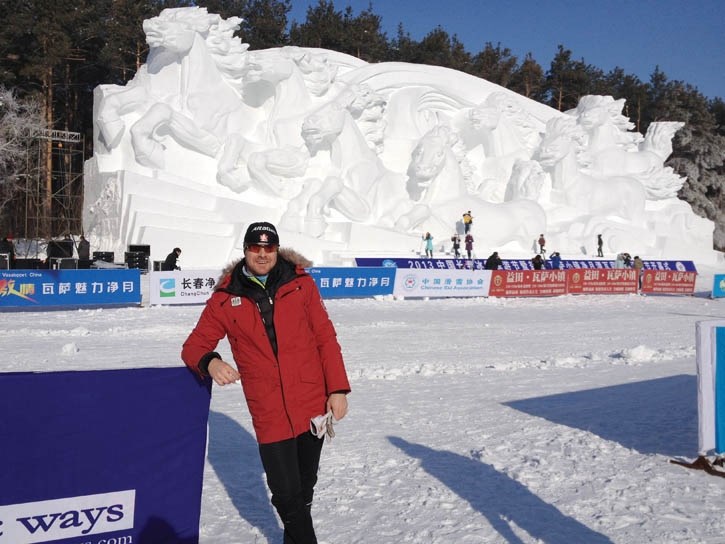Bullet trains speeding across western China, 30,000 fans screaming fans in front of 30-foot-tall snow sculptures, feted at massive banquets with traditional dancers and ceremonies at five-star hotels.
This is what retirement looks like for cross-country skier Drew Goldsack.
The former Canadian National team member was the lone North American invited to compete in the Chinese Tour de Ski event, which included seven stops across China. Although he retired from racing last winter, he held his own against a select number of racers, finishing fifth twice on the tour in what was his first visit to China and Mongolia.
The tour is meant to increase the sport’s popularity in China, growing support at the grassroots level, and from what Goldsack saw, the sport is growing. The 50 km loppet attracted 30,000 live spectators and 30 million viewers on state television, and several emerging European skiers as well as older “ski stars.”
“The idea of the event is to help promote skiing in China and bring a higher level of competition to China than they would regularly have. Twenty-five Europeans and 25 Chinese racers competed. Some guys were good, some were new to ski racing,” Goldsack said.
Chosen as one of the “ski stars,” Goldsack was celebrated everywhere he went.
“We all got the celebrity treatment. The Chinese were incredible hosts. They wanted to make sure we had a great time while there. It was full-on: nice five-star hotels, every town had big banquet and great food, lots of partying and fun.”
The Chinese trip was by no means planned for Goldsack, who now has a career in film.
In December, he received the invitation from retired skier Peter Larson to join the tour for free, which is run by a Swedish event planning company.
“I had barely skied at all. He talked me into it. I did some last minute cramming. I hadn’t done any interval training or racing, so I did a couple of hard workouts to make it as least painful as possible,” Goldsack said.
To make matters tough on his fitness, Goldsack, who was a sprint specialist on the World Cup, had to start the series with a 50-km loppet in Changchun.
“In my best shape, I was hardly a 50-km skier. I got together with a few of the sprinters and we cruised through.
“It was a very big deal. It was broadcast on statewide television and they had a big ball broadcasting live from the banquet with 30 million people watching,” Goldsack said. “For an obscure event, they made a very big deal out of it.”
China has produced World Cup calibre racers in the past, and hosted a World Cup race in 2008, however the sport is still growing. Most strong cross-country skiers end up as biathletes, as the nation’s military background means biathlon is a higher profile sport in the country.
“It’s not super high level. Some of the guys were pretty good. Mostly we were racing young skiers in their early 20s,” Goldsack said. “The events were extremely well organized.”
From Changchun, tour stops also included Inner Mongolia, northwest China and southwest China near the Afghanistan border.
“It was quite cold. For a few of the events we had quite big crowds, especially in the western part of China. Some of the spectators had hardly ever seen Westerners before,” Goldsack said. “They chatted with us as much as possible. They wanted to find out what we thought of the ski courses.”
Although the races were chilly, the food was incredible, he said.
“It was a concern going over there, but it was incredibly great food,” he said.
He described the conditions as World Cup calibre and said the nation would be a good addition if FIS is looking to expand.
“They’re more than capable of hosting a World Cup. It’s great to see somewhere else. They’re getting there in terms of snowmaking and at Changchun, it’s a city of 8 million so they have a huge volunteer and fan base,” Goldsack said. “It was a really great expereience. I had never been to china before. Not many think of China having much skiing. It’s great to see is enthusiasm for skiing around the world.”
He’d like to race again, especially with some more training.
“I left wishing I had put in some more training. They had good prize money,” Goldsacjk said, noting first place in each race received 6,000 yuan, which is $1,500 Canadian. “I didn’t expect to be competitive, but I found some life in those legs.”




